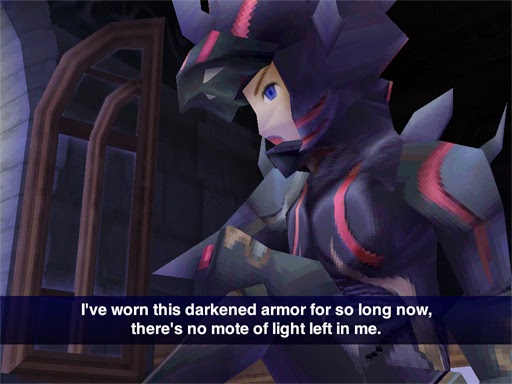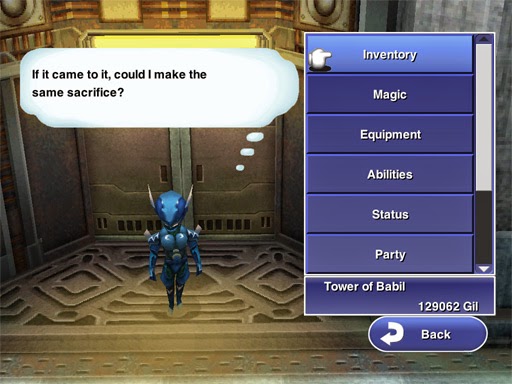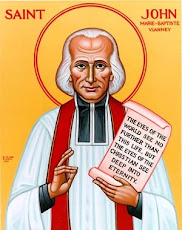Final Fantasy 4 never reached England for the Snes and so I first played FFIV on the Playstation as part of the Final Fantasy Chronicles, and this was an imported copy because, again, Square didn't release Chronicles over here either. I was probably 15 at the time, my younger brother and I chose the Hard Type version to play, and I can remember how much levelling up was involved to progress slowly but surely through a pattern of town to dungeon to town to dungeon. We enjoyed playing 4 but I remember that my teenage impression was of how much behind FF6 and Chrono Trigger seemed to be in terms of gameplay, story and characterisation. 10 years later playing the game on the IOS (and having replayed the snes version about 3 years ago as well), my opinion has completely changed- I would now rank the game as up there among my all time favourites; not only because I have come to appreciate some of the interesting novelties of ffiv gameplay, but most of all because I think in the plot and characterisation we have the most pro-Catholic of all the FF games. There are only a minor number of ethical problems with the game and these are mostly in terms of modesty, the underlying philosophy in the game and moral outlook of characters is basically Christian and we even have a natural theology that, unlike most of the FFs, accepts the existence of Almighty God and doesn't feature Him as some kind of evil overlord. Also, like Chrono Trigger, the game doesn't take itself too seriously- a major fault in most of the later FFs and most modern RPGs- they try and expound a vision of reality, a hard, tight knit science fiction narrative, rather than allowing imaginary fantasy elements to simply be imaginary elements.
Let's then go through the usual categories to analyse how supportive Final Fantasy IV is to a Catholic worldview.
Character and identity
Each of the characters in Final Fantasy 4 has his or her own distinctive attributes profile, a feature readers may be familiar with in Final Fantasy 9. Characters are clearly determined as to what their role in battle ought to be- we have a summoner, a white mage, a ninja, a knight, a dragoon etc and each class has its own unique set of abilities. Readers of my other reviews will know that I really favour this style of gameplay mechanics in RPGs, I think it most corresponds to a true vision of vocation and that flourishing comes from living in accord with the design that God has built in to you, rather than in FFX for example, where each character is capable of eventually becoming the same as any other through the power of their own choice.
 Within the narrative there are some enjoyable characters and the DS remake, featuring occasional voice-acting, brings a greater realism to them. Characters are quite sure about their vocations in life, and they are aware that living in accord with them is not an obstacle to their freedom but the enhancement of it. There is a good amount of humour running through the game, and also a sense of fraternity among the party members.
Within the narrative there are some enjoyable characters and the DS remake, featuring occasional voice-acting, brings a greater realism to them. Characters are quite sure about their vocations in life, and they are aware that living in accord with them is not an obstacle to their freedom but the enhancement of it. There is a good amount of humour running through the game, and also a sense of fraternity among the party members.Reality of Objective Moral laws.
The game endorse the idea that there is a real distinction between good and evil and that evil is anti-life. The crystals somehow sustain life (and unlike in FF9 there is no hard piece of sci-fi to divinize the crystals) and Golbez (controlled by Zemus) is having them stolen in order to further a wicked plan. Often Golbez uses trickery to try and get Cecil (the protagonist) and his party to obtain crystals for him, he, for example, is able to appear as allies of the party, he also seems to have a certain power over anyone who is still wedded to darkness (evil). The party does not resort to trickery in response to Golbez, and Cecil, above all, is driven by a sense of justice to conquer evil.
An area of morality where the game falls short is in modesty- all the female party members wear too little. If I was Cecil, I would tell Rosa to get some more clothes on, she is dressing like a prostitute. The worst aspect of the DS version are the dancing stripper girls that perform little dances for you if you ask them to, this was unfortunate. There is also a town where there is a brothel, and the player is able to spend a load of gil in order to be 'entertained' by a bunch of the stripper girls. On the positive side Cecil makes no comment about the situation, and a lot of the things that the NPCs say in the brothel mock the situation rather than glamorise it.
Interior Struggle to pursue the good.
This is really where the game excels. In the early part of the game Cecil is a 'dark knight' experiencing pangs of conscience upon being given orders to seize the crystal from a defenceless village. On a second mission to seize another crystal, he realises that he can't obey the orders, resulting from his expulsion from his job as commanding the 'red wings'. It is not enough the for Cecil to have rejected evil, he must also do penance and make a concerted return to the good, he returns to the town which was destroyed by his countrymen and begs forgiveness, he then has to travel to the height of a mountain in order to confront his darkness and renounce it. Cecil has a mystical experience of some kind on the mountain, where he is given a vision from a great light, and in the light he is transformed into a paladin- a Holy Knight. Through the remainder of the game Cecil is a defender of the weak and forgiving to those who have fallen through weakness. Later in the game we see how characters who have been used by the real bad guy to perform evil show sorrow for their acts, we also see them struggle to resist his influence. Kain struggles throughout the game but finally he seems to conquer himself and the temptations of evil, and as the game closes we see him on the holy mountain where Cecil had his conversion, hoping to experience a like transformation through penance.
Divine Providence working through free will.
Do the victories of the evil one ultimately bring about his demise? The game does not reflect too deeply on this matter. Do the deeds of good men with free will somehow accomplish grand ends? I think so, a good example is the scene where the white and black mages gather to the tower of prayer and pray that the 'prophecy will be fulfilled' and their prayers are heard, bringing about the return of the 'lunar whale' who can enable the party members to travel to the moon. Another example is when, early in the game, Cecil chooses to save Rydia a summoner who has somehow survived his army's attack on an innocent city, Rydia will later prove to be essential to the party.
Self Sacrifice for others
Again, FF4 scores really high on this point, almost half of the characters who join the party attempt to sacrifice their lives to save others! The ones who survive both mourn the loss of a beloved companion and profess gratitude towards him. When I first played FF4 I was a little annoyed that a lot of the characters who sacrificed themselves for others somehow manage to survive against all odds! Looking at the game now I see this as part of the game's innocence, and also as getting the point across that virtue is rewarded, even, occasionally, in this life. My favourite act of sacrifice is performed by Tellah, where, reminiscent of the summoner from FFX, he performs a spell which ought to destroy the evil one, but he knows that performing it will take his own life. Unlike Yuna, who sadly never took this noble route, Tellah performs the meteo spell, and suffers the consequences.
Basic Christian Theodicy- Monotheism, Goodness of creation, understanding of eternal reward/punishment based on moral behaviour.
 No JRPG can be expected to have a perfect Christian Theodicy, there are always oddities. Characters mention heaven, but we don't hear much, if anything, of hell though and heaven without hell is a mockery of the divine order. Like in Chrono Trigger, there are a number of apparitions of deceased good characters, such as the King of Baron, who explains that his body is gone but his mind will live forever. Cecil's father, also deceased, appears to Cecil from beyond the grave. So there is a definite continued existence of the good. There is however a problematic statement when Edward's girlfriend, who has died, appears to him but says she must depart as "the spirit calls me onward to be part of it again", what that means who knows? But it is off from a Christian natural theology. I don't think the game makes a big deal of the statement though and I may be being over-sensitive about this.
No JRPG can be expected to have a perfect Christian Theodicy, there are always oddities. Characters mention heaven, but we don't hear much, if anything, of hell though and heaven without hell is a mockery of the divine order. Like in Chrono Trigger, there are a number of apparitions of deceased good characters, such as the King of Baron, who explains that his body is gone but his mind will live forever. Cecil's father, also deceased, appears to Cecil from beyond the grave. So there is a definite continued existence of the good. There is however a problematic statement when Edward's girlfriend, who has died, appears to him but says she must depart as "the spirit calls me onward to be part of it again", what that means who knows? But it is off from a Christian natural theology. I don't think the game makes a big deal of the statement though and I may be being over-sensitive about this.What's absent is any idea of judgement, that is, that evil characters who have perverted their nature in this life, necessarily endure separation from the good in the next life. Slightly problematic is the fact that the deceased king says that he will now be an eidolon, that is, a 'summon'. In ff4 summons are not gods but more like fairies that have their own little town and come to help the summoner that calls upon them, this is a nice understanding of summons, but it seems a bit messy to view a dead human as becoming a fairy.
The nature of evil is slightly problematic, there is some suggestion that evil is necessary so long as there is good- the idea that the existence of light necessitates the reality of darkness. The two are not depicted as equally powerful forces though, light outshines the darkness.The final badguy is never completely destroyed and he promises that he will always exist so long as evil dwells in the hearts of men, I would have preferred if he had been destroyed and seen descend into a fiery lake of punishment, and then said, "others will follow me so long as evil dwells in the hearts of men".
Prayer is mentioned quite a bit, the only problem with its usage though is it isn;t precisely clear to whom the prayers are being directed- and there is a possibility that by 'prayer' what the game really means is a telepathic energy source. At the very end of the game two characters depart into a lengthy sleep and promise that within this stasis they will 'pray for the peace of the planet', it is a good message.
There is no mention of God, a personal Almighty Creator of all that is, there is one line that refers to the existence of 'gods'. The FF4 universe is theistic but there is nothing as strong as the 'Entity' of Chrono Trigger.
Conclusion
When you put FFIV alongside FFX, XIII, VI, VII, Tactics and Xenogears I think it stacks up as the most Christian of the FFs, there is no major earth-spirit Gaia theme which plagues VII and IX, and there is no 'atheism is liberation' trope like you get in X and XIII. I really enjoyed the battle system of FFIV, it is simple but enjoyable, and there are some great player abilities such as Edward's automatic 'Hide' when he is low on life, and Edge's 'throw' ability which lets him throw any piece of weaponry at an enemy. A lot of the stuff which characterises later FF gameplay is here in FFIV for the first time- I think FFIV was the first FF to have an engrossing storyline and a quality soundtrack. There aren't any minigames, there are only a couple of little sidequests, but there are plenty of secret treasure chests and enough things to make the game worth a second and more thorough play through.
FFIV is a fun game, but be prepared for a lot of grinding! Especially if you play through the DS hardtype mode. The IOS version is a lot easier that DS because it automatically saves you at spots between save points, so you lose very little if, or rather when, you happen to be knocked out in a random battle featuring ridiculously hard enemies that would be ok in a group of 2, but not a group of 5!
The game isn't the Catholic RPG I have been looking for, as Lord of the Rings could be said to be the Catholic fantasy fiction, I think that still needs to be produced, but it gets close to the heights of Chrono Trigger in some areas and in the area of 'interior struggle to pursue the good' it clearly surpasses it.
Like CT, the game wears itself lightly, it knows it is a game and lot a philosophical treatise and it doesn't try to reduce everything to matter- we have spirit, we have mind, we have prayer. I think I would be quite comfortable giving this game to a child or teenager in a way a wouldn't for a lot of rpgs. I think it can, in parts, be a preparation for the Gospel.














2 comments:
Do one for FF6!
Post a Comment